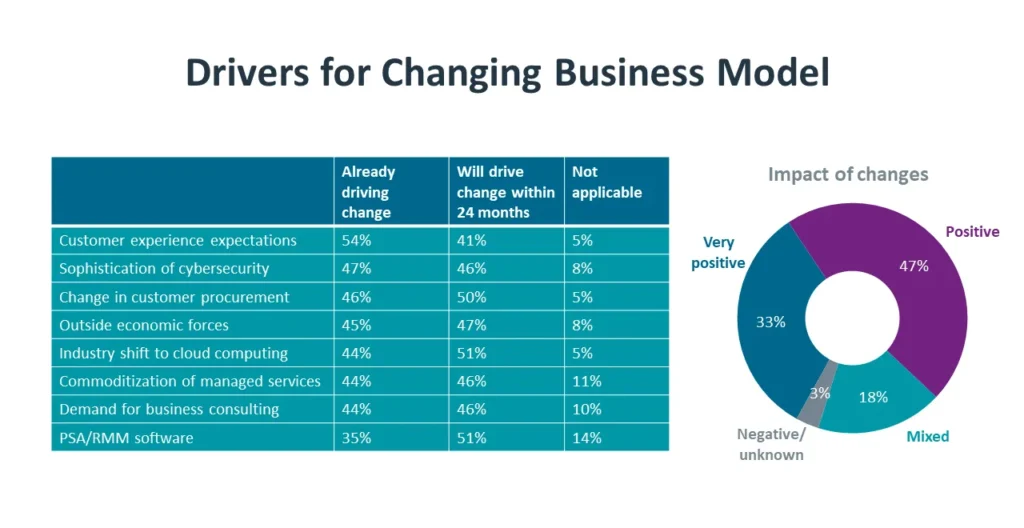Businesses tend to scale their productivity with consistent transformation through the adoption of modern technologies. It is important for the owners to think differently in order to cater to the constantly evolving market standards.
Numerous companies are now proactively addressing operational challenges and shortcomings in their existing operating models, driving them to embrace managed services provided by professional service providers.
This article provides valuable insights into the ways in which managed service providers (MSPs) contribute to enhancing business transformation and productivity.
Adapting to Change: The Urgent Need for Managed Services in Modern Business Operations

Figure 1: Drivers for Businesses to Change their Service Model
Image Source: channelinsider.com
The traditional operating models of businesses are facing significant challenges as they struggle to adapt to evolving market demands and leverage new technologies. The disruptions caused by factors such as changing consumer behavior and the need for efficient supply chains have exposed the limitations of traditional approaches. In light of this, businesses that resist transitioning to a managed services model may find it difficult to survive and thrive.
The shortcomings of traditional operating models are evident in several areas, including the inability to prioritize cost reduction, effectively utilize new technologies, optimize key functions like tax, risk, finance, and compliance, manage evolving regulatory obligations, meet performance and ROI expectations, and leverage data analytics and digital tools for deeper market insights. These challenges highlight the need for alternative solutions, with the adoption of a managed services model emerging as a viable option. Consequently, hiring a managed service provider has become more critical than ever.
It’s important to note that while not all businesses will perish without adopting managed services, there is a growing recognition of the advantages and value that such a model can bring. Rather than facing potential setbacks and limitations within existing operating models, businesses can embrace managed services to overcome these challenges, optimize their operations, and achieve greater success in the dynamic and data-driven business landscape.
How are managed services helping businesses transform?

Figure 2: Key Business Transformation Approaches
Image Source: pwc.com
Transformation is not just about bringing in new technologies or making internal improvements. It is about reimagining or rebooting the entire business infrastructure and making it more agile and resilient. And for most businesses, the path to transformation can be enabled through an MSP.
By embracing managed services, businesses undergo a transformation that leads to enhanced productivity and profitability in multiple aspects, which encompass:
1. Reshaping the Business Expenditure
With managed services looking after the major business functions, you get the liberty to avoid fixed capital and humongous upfront expenses.
The MSPs are strong in their domains and have made ample investments in order to help their clients conduct their key functions more effectively and efficiently. Hence, your business will reap some instant savings in the pursuit of reshaping or revamping its approach to making a capital investment.
2. Using Insights for Promoting Business Innovations
With managed services, you will be taking a leap toward successful business transformation at a faster rate. As a result, you will be able to make quick decisions on fostering innovative solutions for your business’s growth.
The managed service providers will help you in this arena with their deep expertise in the industry and critical analytics of data. Thus, the strategic shift in operations and technology will be more profound and business-centric.
3. Cope Up with High-Paced Agility Requirements
Businesses need to adapt to the changes faster in order to keep up with market trends and overcome the disruption. Hence, to build this agility within business operations, companies must rethink their existing ecosystems.
Hiring a managed service provider for your business will help you build new ecosystems alongside the experts to integrate high-paced agility in order to cope with the changing industry demands.
4. Boosting Digital Transformation
Before 2020, most businesses were just starting off with the use of digital tools for enhancing business operations and service offerings. MSPs enable digital transformation by providing businesses with access to cost-effective advanced technologies, expert teams, and comprehensive services, streamlining the transition from traditional practices to a digitally-driven ecosystem.
Some of those technologies that the MSPs help your business integrate with are AI, automation, ML, trusted intelligence, and much more. The service providers also have expert team members to manage these technologies for you without any additional cost or challenges.
5. Improved Security
One of the biggest benefits you get from hiring an MSP is enhanced security!
MSPs (managed service providers) employ various best practices to enhance security for businesses. Some of the common practices include:
- Regular Security Updates: MSPs ensure that all software, operating systems, and applications are regularly updated with the latest security patches to address vulnerabilities.
- Network Monitoring: They continuously monitor the network infrastructure for any suspicious activity, unauthorized access attempts, or potential security breaches.
- Firewall and Intrusion Detection Systems (IDS): MSPs implement robust firewalls and IDS to protect against unauthorized access and detect any intrusion attempts.
- Data Encryption: They employ encryption techniques to safeguard sensitive data, both in transit and at rest, ensuring that even if intercepted, the data remains unreadable to unauthorized individuals.
- User Access Management: MSPs implement strong access controls, such as multi-factor authentication (MFA) and role-based access controls (RBAC), to ensure that only authorized individuals can access sensitive information and systems.
- Regular Data Backups: They establish reliable backup solutions to regularly back up critical data, enabling quick recovery in case of data loss or ransomware attacks.
- Employee Training and Awareness: MSPs educate employees about cybersecurity best practices, such as avoiding phishing emails, using strong passwords, and being cautious with sensitive information, to minimize human-related security risks.
- Incident Response and Disaster Recovery: MSPs have plans in place to promptly respond to security incidents and employ effective disaster recovery strategies to minimize downtime and data loss in case of a breach or system failure.
- Vulnerability Assessments and Penetration Testing: MSPs conduct regular vulnerability assessments and penetration testing to identify weaknesses in the system and proactively address them before they can be exploited.
- Security Audits and Compliance: They ensure compliance with relevant security standards and regulations through regular security audits, ensuring that the business meets industry-specific security requirements.
These practices collectively contribute to enhanced security and provide businesses with peace of mind knowing that their systems and data are well-protected.
Conclusion
For most businesses, irrespective of industry, hiring an MSP makes more sense! Your internal team needs to be free to engage in activities that can scale your service offerings. Managing the back-end IT and other internal operations can be outsourced to third-party providers for streamlined efficiency.
In this way, your core business system remains operational without downtime, and at the same time, you can scale your services as per the demands of end consumers. So, it is a win-win for your business! Thus, managed services help accelerate business transformation .
To learn more about managed services and their benefits for businesses, get in touch with the team at STL Tech.
FAQs
Apart from core business transformations, MSPs also help you with digital evolutions for added benefits. Some of the ways MSPs help you with digital transformation are:
● Deliver you a cost-effective IT infrastructure
● Manage and control the complexity of your business to transform from traditional to digital transformation
Enhance the digital footprint of your business offerings.
The components associated with the managed services model will vary depending on the service provider. But, in common, most of the MSPs will provide you with a combination of some of the services listed below:
● Help desk & support
● Security
● Cloud computing
● Virtualisation
● Backup & disaster recovery
● System management and monitoring
● DC infrastructure management
● Cloud management.
Some of the financial benefits of hiring a managed service provider include:
● You get to predict the business costs. The managed service providers will help you access the best technology and hardware solutions at a minimal payout.
● Monthly spending on important key functions of the business will be controlled in order to help you scale your service offerings in the long run.














